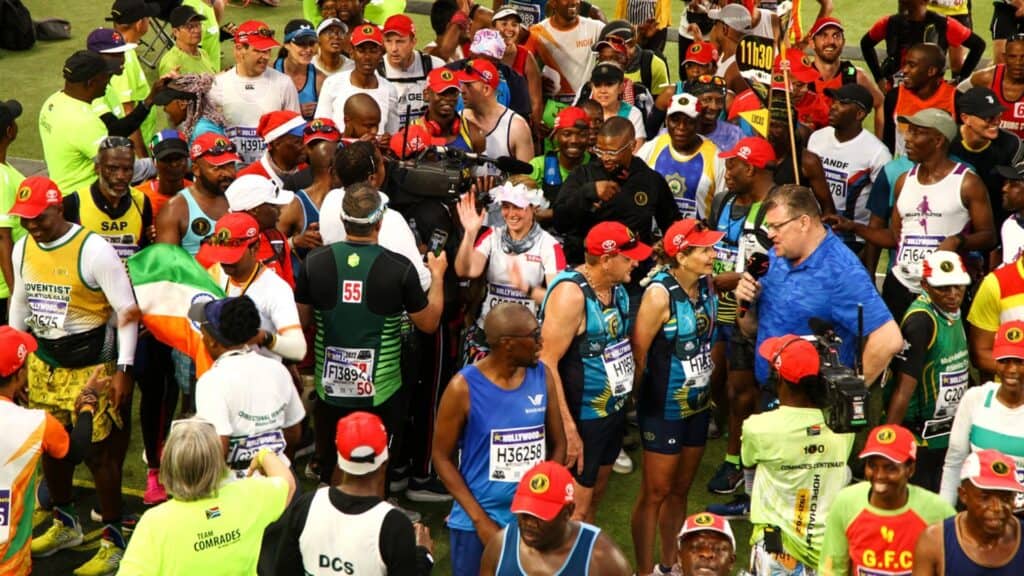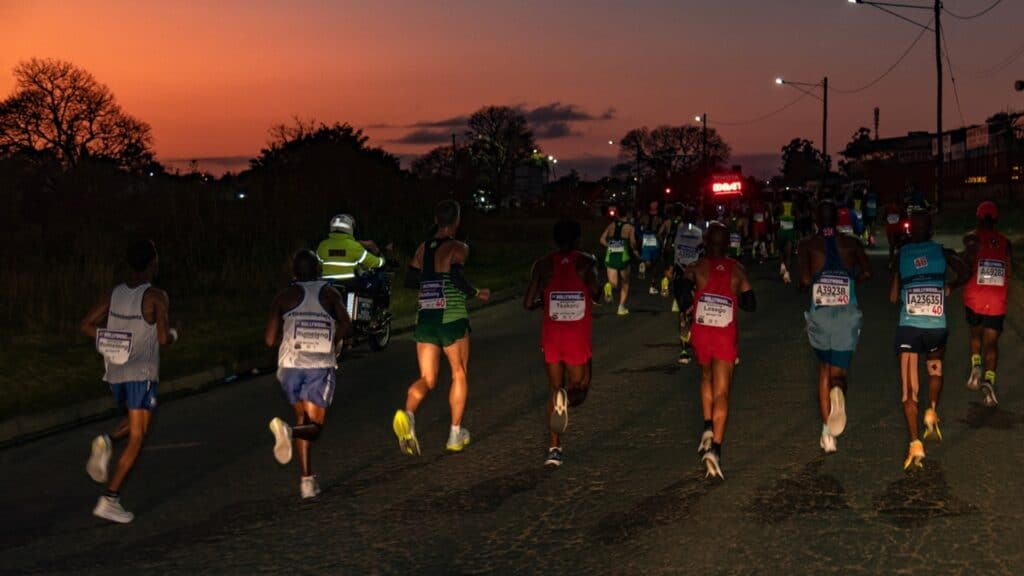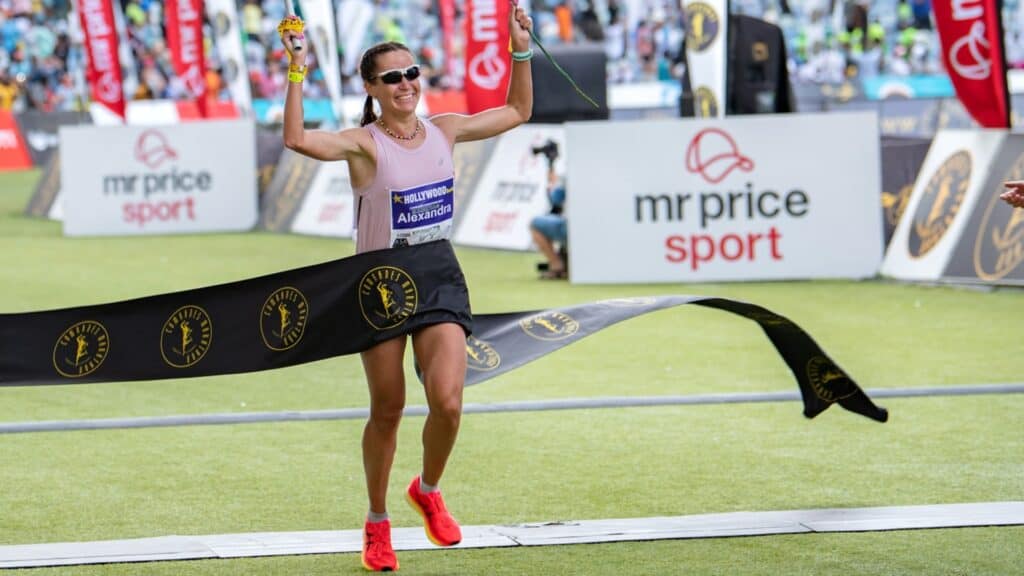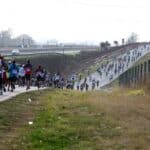Combining the rigorous training schedules of an Ironman 70.3 and the Comrades Marathon can seem daunting, but with careful planning and strategic adjustments, it’s entirely possible.
In a recent episode of our podcast, we discussed how to effectively balance training for both events, addressing concerns about timing, incorporating different types of training, and optimal preparation strategies.

Balancing Ironman 70.3 and Comrades Training
For those aiming to participate in both an Ironman 70.3 in March and the Comrades Marathon later in the year, the diversity of training across swimming, cycling, and running can actually be beneficial.
This varied training is easier on the body and contributes to a well-rounded sense of preparedness.
However, given the demands of the Comrades Marathon, incorporating slightly more running into the training regime is recommended. This doesn’t mean significantly increasing the running volume, as that could compromise recovery, but rather finding a balanced approach.
To manage both training schedules effectively, it’s crucial to strike a balance. If adjustments need to be made, experts suggest cutting back on swim training slightly, as the time lost in swimming is minimal compared to the potential loss in cycling performance. This approach allows athletes to maintain their overall fitness without compromising recovery and performance in either event.
Peak Training Periods and Recovery
March and April are peak training months for the Comrades Marathon. After completing an Ironman 70.3, a short recovery period is necessary. We recommend taking a week off after the 70.3 event to recover fully before diving into intense Comrades training.
It’s also advisable to continue some swim and bike training through April and May, albeit at a reduced intensity, while gradually increasing running volume to prepare for the marathon.
By incorporating diverse training activities, making necessary adjustments, and allowing adequate recovery time, athletes can successfully prepare for both events.
Transitioning from Ironman 70.3 to Comrades Marathon Training
Training for both an Ironman 70.3 and the Comrades Marathon can be challenging, especially when one event precedes the other.
In a recent podcast episode tackled a question from an athlete preparing for the Ironman 70.3 in East London, who was concerned about lagging behind in Comrades Marathon training. The discussion provided valuable insights into how to adapt training schedules and maintain peak fitness levels for both events.
Starting Comrades Training Post-Ironman 70.3
An athlete’s general preparedness level remains high after completing an Ironman 70.3, thanks to the extensive swimming, cycling, and running involved. This high level of overall fitness can actually place the athlete ahead of the curve when transitioning to marathon training. However, caution is necessary to avoid overtraining when shifting focus solely to running.

Adapting the Training Schedule
The key to successfully transitioning from Ironman 70.3 to Comrades Marathon training is to gradually increase running mileage. We suggest drawing a straight line from the current running volume to the target mileage by the beginning of March. This method allows for a smoother transition and helps in avoiding the common pitfalls of overtraining.
Given the athlete’s fitness level, increasing running mileage faster than the typical 10% rule is feasible. However, it is crucial to do this carefully to prevent injury. The goal should be to catch up with the Comrades Marathon training program by March 1, ensuring that the athlete is fully integrated into the prescribed training regimen by that time.
Transitioning from an Ironman 70.3 to Comrades Marathon training requires a balanced approach to leverage the existing fitness level while gradually increasing running mileage.
Staying Focused During December Festivities: Hobbo’s Couch-to-Ironman 70.3 Journey
Balancing holiday festivities with rigorous training can be challenging, especially when preparing for an Ironman 70.3. Brad Brown and Lindsey Parry caught up with Hobbo, who is working towards completing his first Ironman 70.3 in Durban in June 2019.
They discussed strategies to maintain focus and training during the December holidays, along with the upcoming races Hobbo plans to participate in as part of his preparation.
Hobbo’s Progress and First Triathlon Experience
Hobbo recently completed his first triathlon, an impressive achievement that has bolstered his confidence. Despite minor hiccups, like temporarily losing his heart rate monitor, Hobbo successfully navigated the challenges of his first event. His experience highlights the importance of meticulous preparation and staying positive, even when faced with unexpected challenges.
Staying on Track During the Holidays
December can be a difficult time for maintaining training routines due to travel, social gatherings, and festive indulgences. Hobbo is aware of these challenges but is determined to stay on course. He plans to continue his training while traveling, focusing on running and finding opportunities for open water swims and pool sessions.
Expert Tips for Holiday Training
We advise athletes to:
- Exercise Early: Completing workouts in the morning ensures the rest of the day is free for holiday activities.
- Stay Active: Incorporate activities like walking and outdoor sports into the holiday routine.
- Moderate Indulgence: Delay starting holiday indulgences until later in the day to maintain discipline.
Upcoming Races and Training Plan
Hobbo’s schedule includes various races to keep him motivated and ensure continuous improvement:
- Midmar Mile: Focus on maintaining swimming fitness.
- Dischem Ride for Sight: Reinforce cycling endurance.
- Durban Ultra Triathlon: Gain experience with sea swims and the racecourse.
- Olympic Distance Triathlon: Complete the first full triathlon distance.
- Tour of Durban: Further cycling endurance.
- Sun City Ultra: Additional triathlon practice.

Weight Loss and Fitness Gains
Hobbo has lost 16 kilograms, significantly enhancing his performance. Maintaining this momentum is crucial, and a food diary has been instrumental in keeping him accountable. The physical transformation also contributes to better training outcomes and overall confidence.Hobbo’s journey from couch to Ironman 70.3 is a testament to dedication and effective planning. By staying disciplined during the holidays and continuously participating in races, he is well on his way to achieving his goal. Following expert advice and maintaining a structured training plan will help him navigate the festive season without compromising his progress.



Comments are closed.